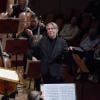
In the first major orchestra concert in Santa Barbara’s 2024–2025 season, the spotlight turned to the London Philharmonic Orchestra (LPO), bringing an expectedly polished and cogent sound to The Granada Theatre as part of the ensemble’s U.S. tour. The concert came courtesy of UCSB Arts & Lectures, in association with the venerable Community Arts Music Association of Santa Barbara.
The musical selections were well balanced, from a subtle and invigorating encounter with the music of contemporary Cuban American composer Tania León (who’s currently in residence with the LPO) to the heft and substance of Tchaikovsky’s Symphony No. 4 and Dmitri Shostakovich’s Violin Concerto No. 1. Throughout, Principal Conductor Edward Gardner led with flowing but fiercely concentrated focus, and the orchestra displayed a lush sound and muscular mass.
In the end, it was the reckoning, enlivening force of soloist Patricia Kopatchinskaja that made the concert memorable. The violinist created something of splash in this region back in 2018 when she substituted for Esa-Pekka Salonen as music director of the Ojai Music Festival, and fans awaiting her return were handsomely rewarded and provoked — in the best way — at the Granada.

The Moldovan-born Kopatchinskaja is a virtuoso who goes her own way, thrashing against conventional wisdom with her interpretations while almost invariably conferring her own measure of respect on compositions we thought we knew. Her approach to Shostakovich’s concerto, which was composed in 1947–1948 for David Oistrakh but kept on the shelf until 1955 to avoid Soviet censorship, was particularly revealing.
Unshod, as is her custom, and occasionally impacting the performance with well-placed stomps, Kopatchinskaja worked dynamic extremes to potent effect. She shifted gamely and organically from the wary, whispered phrases of the enigmatic Nocturne to the dervish-like whorls of the Scherzo, the micro-drama of the cadenza, and the infectious ferocity of the final Burlesque’s mad choreography between ensemble and soloist.
It was a dramatic but ultimately cohesive take on the piece, full of surprises and yet possessing a seamless overall logic, confirming the impression that Kopatchinskaja is a notable outlier among upper-echelon violinists. She knows how to work that fragile, idealized fulcrum between control and abandon. It’s her own private paradox. She nails it, while also impulsively searching for it.

León’s 2023 orchestral work Raíces (Origins) demonstrates her alluring ability to balance accessibility with experimentalist leanings, making for an approachable contemporary language that touches on modernism, her Latin American origins, and jazz influences.
Raíces lures us into a distinctive sonic world, opening with a sparkling array of gestures on a loose rhythmic grid. It’s an ephemeral and mysterious gem of inventive orchestral writing. Rhythms are implied in undertow fashion rather than stated blatantly. The harmonic palette appears largely tonal and modal — but with disarming moments of dissonance slicing through the ambience, as in a renegade piano passage. A dreamy vibraphone part guides the score to its gently fading close, along with the exotic sound of a chime made from animal nails.
After the cerebral thrills of the concert’s first half, the lumbering, if elegantly rendered performance of Tchaikovsky’s Fourth felt a bit out of place, or at least sequestered in its own nostalgia. Gardner and company threw themselves into the spirit and letter of the piece and delivered what seemed close to a definitive reading, a confident sense of “this is how it goes.” The LPO expertly dispatched the march-like burliness of the opening, the tuneful strains of the second movement, the perky pizzicato jollity of the Scherzo, and the feverish gush of the Finale, which can sound like John Philip Sousa on speed in lesser hands.
For an encore and toast to the U.K., the orchestra cozied up to “Nimrod” from Edward Elgar’s Enigma Variations, played with insider insight and sentiment.




